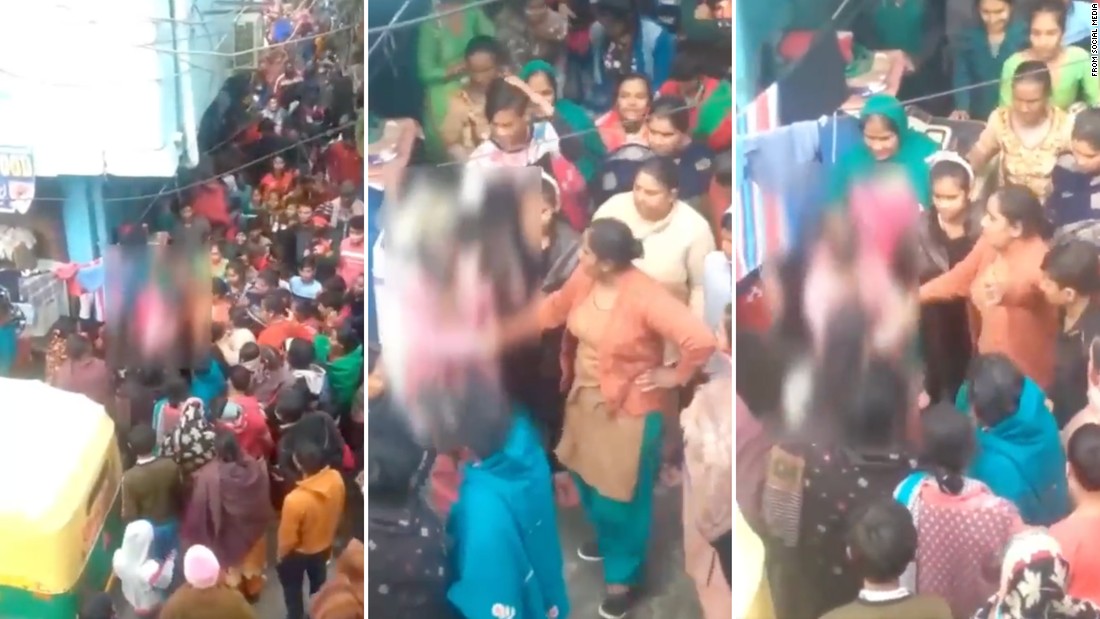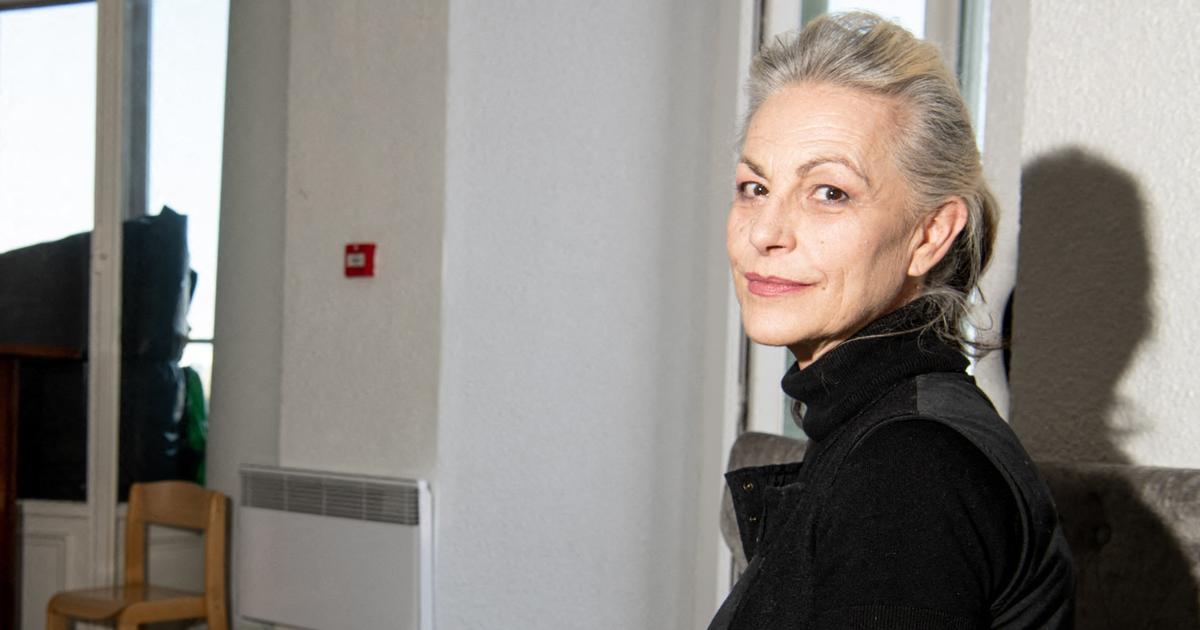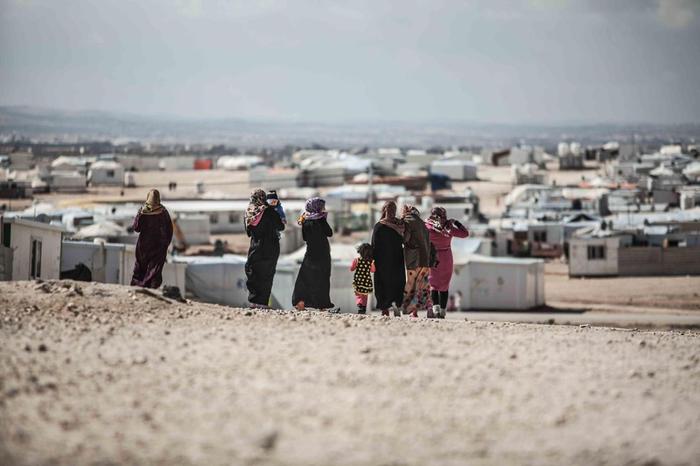Do you suffer sexual violence?
The Time Out platform can help you 2:50
Delhi (CNN) --
Her hair was cut and her face painted black before she was led out onto the street, where some people in a crowd were calling for her to be raped.
But perhaps the most shocking aspect of the attack in a Delhi neighborhood last month is that video shared on social media shows that the majority of the screaming crowd were women.
Delhi police have arrested at least 12 people, eight of whom are women.
Two are minors.
Police did not press charges for the incident, but say the 20-year-old victim of the Jan. 26 attack was kidnapped and physically and sexually assaulted.
The alleged participation of women struck a nerve in a country that has long struggled to tackle gender-based violence.
Activists say the case demonstrates the scale of internalized misogyny in India, where women are taught to uphold patriarchal structures.
A series of images taken from a video circulating on social media shows a 20-year-old woman parading down the street after being physically and sexually assaulted.
The video was blurred by the source.
They fear that violence against women will worsen as support grows for far-right political groups that promote traditional patriarchal values.
Swati Maliwal, chairwoman of the Delhi Women's Commission, said the woman told her she had been raped by three men.
"There were women present (in the room) ... instigating the men to be more brutal with her," Maliwal told CNN, recounting what the victim had told her.
"When I saw that video and I saw these women attacking this girl... it just makes you feel so angry and sad to know that you have women who can do something like that."
It is unclear if any of the people caught on video in the crowd are involved in the alleged assault or if they have been booked by police.
They sue Iceland, the "best place in the world to be a woman", for misogyny
The victim's sister watched part of the attack, but was unable to stop it.
"I was thinking of screaming, of telling someone, but the (accused) women grabbed me, saying they were going to hit me," said the 18-year-old, whom CNN calls Aarti to protect her sister's identity as she Indian law prohibits revealing the identity of rape victims.
Aarti told CNN that her sister, who is married, was attacked by relatives of a teenager, who they say killed himself after her sister rebuffed their advances.
CNN has tried to contact the representatives of the alleged criminals, although it is not clear if they have lawyers.
"They (the alleged perpetrators) blamed her, but she did nothing," Aarti said.
"I never thought they would go this far."
The attack
On the morning of January 26, Aarti told CNN that she went to deliver a bag of wheat to her sister's house in the Shahdara district of East Delhi.
But when his sister came downstairs to pick him up, an angry crowd rushed inside.
"They started hitting and beating my sister. This was happening in front of me, but I stood there, I didn't know what to do...I was frozen with fear," Aarti said.
The teenager does not remember how many people there were, only that there were "many" and among them were men and women from another local family.
Aarti said the group tried to snatch her sister's two-and-a-half-year-old son from her, but Aarti "somehow fought them off" and held onto him as the group loaded her sister into a motorcycle taxi.
Grabbing her nephew, she followed them in another motorcycle taxi, accompanied by two of the alleged perpetrators, to the Kasturba Nagar residential area of Delhi, less than three kilometers away, where the alleged perpetrators live near the house Aarti shares with his father.
Kasturba Nagar is a low- to middle-income neighborhood in Delhi where women sit and chat outside brightly painted houses and men cluster around local tea shops.
On the day of the attack, people were off work to mark Republic Day, the anniversary of the day India's constitution was adopted, but the day has taken on new meaning for Aarti and her family.
The Shahdra district of Delhi, where the alleged attack took place on January 26.
The motorcycle taxi stopped at the house of the alleged perpetrators, but since Aarti could not see her sister, she entered her own house and closed the door.
Shortly after, she heard a commotion outside, and from behind a wall she saw her sister being led down the street as the women beat her with sticks.
Her hair had been cut short, her face blackened, and she had a garland of slippers around her neck, all actions intended to mark her as perhaps deserving of public shame.
Aarti said the women led her sister around the neighborhood, pushing, slapping and hitting her sister for at least half an hour.
"I couldn't believe that no one in the neighborhood spoke up or tried to help, they were just cheering," Aarti said.
Aarti said she called police on a borrowed cell phone and they arrived 15 minutes later.
At the police station, Aarti's sister told her that she had been locked in a room where she had been "wronged", a colloquial phrase in India referring to sexual assault, before being paraded in the street.
R Sathiyasundaram, the deputy police commissioner of Shahdara district, said the investigation is still ongoing and did not say under what laws the alleged perpetrators were arrested.
He refused to confirm the nature of the sexual assault or confirm the details of the incident.
“We cannot reveal all that, it is a matter of investigation,” he said.
internalized misogyny
Although many Indians were shocked that women allegedly incited rape, others say it's not surprising in a country with strong patriarchal values.
Ten years ago, lawyer Seema Kushwaha represented "Nirbhaya," a 23-year-old student who died after being gang-raped on a Delhi bus in 2012. Outrage led to stricter anti-rape laws, but campaigners say that have had little impact in curbing the level of sexual violence in India, which was ranked the world's most dangerous place to be a woman in a 2018 Thompson Reuters Foundation survey of women's issues experts.
Kushwaha says the problem persists because of social issues, and those are harder to change.
She says that in patriarchal societies women are taught that they are ultimately to blame for any wrongdoing, and last month those deep beliefs came to the fore on the streets of Delhi, when women reportedly rallied against a of theirs.
Bogotá aims against gender violence at its origin: machismo.
And he does it with a line for men
“If the fight against crimes against women is a fight of the female gender, the women should have supported the girl… but they did not do that, they beat her because they are ingrained that whatever the men do, the responsible ones are the women. women,” he said.
In families, mothers-in-law often restrict the freedoms of a new bride.
In public, it is often women who monitor other women's actions or dress.
The attack in Shahdara is an extreme iteration of that, Kushwaha said, where the women allegedly resorted to cruelty against another woman to avenge the suspected suicide of a teenager.
According to data from India's National Crime Records Bureau, crimes against women were 20% higher in 2020 compared to 2013—the last year before the ruling Bhartiya Janta Party (BJP) came to power—and the latest figures for 2020. However, those statistics may not capture the full picture: as in other countries, rapes often go unreported, and an increase in rape reports could reflect greater awareness about reporting violence sexual.
Kushwaha, who was recently appointed spokesperson for the Bahujan Samaj Party (BSP), which was formed to represent caste minorities, says that while no government can be singled out for violence against women in India, the rise of ideologies right-wing in the country threatens the safety of women.
CNN has reached out to the Indian government's Ministry of Women and Child Development for comment on the rising number of attacks on women, but has not received a response.
In a statement to the upper house of parliament last February, the Ministry of Women and Child Development said the central government had taken a number of initiatives to address women's safety, such as strengthening legislation.
But he added that state governments are responsible for law and order and the safety of citizens.
However, the police in the national capital of Delhi are under the central government.
Aarti said that this was not the first time that the alleged perpetrators attacked her sister.
They had been harassing them for weeks, showing up at their houses and insulting them from time to time since the boy's suicide in November, he said.
Kolkata college students stage a rally in support of a 20-year-old woman attacked in New Delhi.
A week before the attack, Aarti said he filed a police complaint against the alleged perpetrators after they allegedly set fire to his father's motorcycle taxi, which he rented for income because he is paralyzed.
When asked to comment on the complaint, Deputy Commissioner of Police Sathiyasundaram did not respond.
Sathiyasundaram also refused to share information about the alleged perpetrators' motive for committing the crime, saying it was "under investigation."
Pragya Lodha, a clinical psychologist with the MINDS Foundation, a nonprofit mental health organization, said if it was true that the woman was targeted for the teen's suicide, it reflects the lack of mental health awareness in India.
"There is no direct cause and effect when it comes to suicide ... it is rare that sheer rejection has led to suicide," he said.
While Lodha said that attitudes around mental health are changing in India, especially during the last two years of the pandemic, there is still a huge gap between the privileged classes in society who have access to mental health and the large rural and semi-urban masses that do not.
Lodha said that even in major cities like Delhi, access to mental health services can seem unaffordable, and there remains a stigma around mental health problems.
The way to follow
The Delhi authorities have indicated that they want the case resolved quickly.
Delhi police have set up a 10-member special investigation team and Delhi Chief Minister Arvind Kejriwal has said the government will engage the victim with a "good lawyer" and expedite the case.
"That is a start, but much more needs to be done... I am going to keep an eye on this case because I want the investigation to be completed in a very short period of time," the Delhi Maliwal Commission for Women said.
She said a prompt investigation would spare the victim further pain.
A quick resolution would be a stark contrast to most rape cases in India.
According to Kushwaha, the lawyer, it often takes a year or more to register and investigate rape claims, even though Indian law requires investigations of rape cases to be completed within two months.
Cases can take years to reach court, and many suspected perpetrators are out on bail while awaiting the outcome, sending the message that the law is powerless to stop them, according to Kushwaha.
And even after all that, less than half of the rape complaints that make it to trial lead to a conviction.
For example, in 2020 only four out of 10 cases ended in a guilty verdict, according to the latest statistics from the National Crime Records Bureau.
"Even when convictions happen, they happen in 10 to 15 years," said Kushwaha, the attorney.
Maliwal of the Delhi Commission for Women says part of the problem is the lack of speedy courts to deal with rape cases.
Three women brutally murdered in one day in France, at an "intolerable" start to the year
In 2019, the central government approved a plan to open 1,023 fast-track courts across India to help clear the backlog of rape and child sex crimes.
However, according to data presented by the Minister of Law and Justice in the upper house of parliament in December 2021, only 681 such courts had been established.
In addition to the law, there must also be a focus on education, with children in all schools having access to sex education and gender studies, Kushwaha said.
Violence against women will only decrease if India's patriarchal culture changes to create a more equal society, he added.
For more than a week, police have been surveilling both ends of the street where the attack took place.
People slow down as they pass and try to look inside.
Aarti still lives in her family's house, meters from the house where her sister was attacked, on the same street where she was paraded and mocked.
"I'm not going anywhere; I can't afford it," Aarti said.
"I'm 18 years old, I don't have a job and I need to take care of my father," he said.
"I'm glad my sister is home... I gave her child back to her; I was happy to see her."
gender violence







